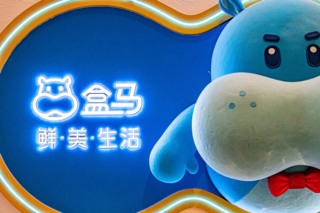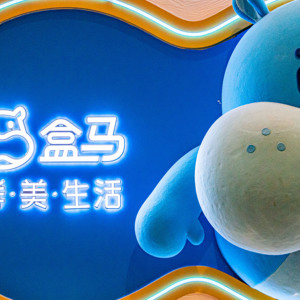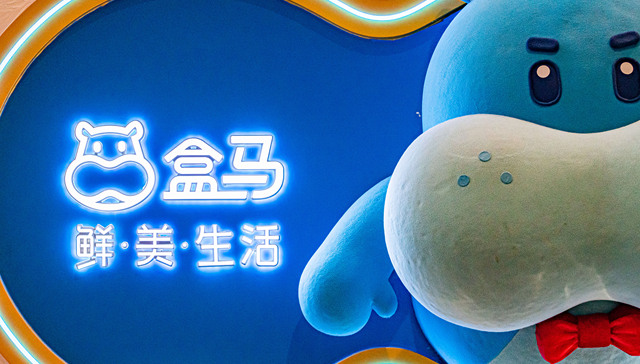By ZHANG Xiaoyi, ZHAO Xiaojuan
Hema Fresh once wowed customers with exotic food and a novel online shopping experience. Now, facing slowing sales and competition from foreign big-box retailers, it hopes to make itself affordable through an extensive overhaul of its supply chain.
Tea and cake at Hema
In early October, YANG Yi got a message from a buyer at Hema. The chain would now pay less for two cakes supplied by his bakery. He loses money at the new price. The buyer’s offer: eat the loss, or walk away.
Around the same time, WANG Yumeng, founder of the tea brand Chabiubiu, was notified that Hema Fresh would stop carrying her products. In a teary blog post, she detailed all the hardships of a young woman running a consumer startup during the pandemic years. She had mortgaged her house to keep Chabiubiu alive. Now Hema Fresh dealt a fatal blow.

Yang and Wang are two minor casualties of the great overhaul. The company announced has reduced its range from 8,000 to 5,000 items and slashed the prices of the rest by up to 20 percent.
Trending for all the wrong reasons
Once lauded as the “grocer of the future,” the company is now grappling with surplus inventory, sluggish sales, and competition from Cosco and Sam’s Club. Its planned IPO shelved, Hema wants to win customers back with low prices.
The terminations and price cuts caused such outcry among suppliers that the topic surged onto China's X (formerly Twitter)-equivalent Weibo’s trending list.
An importer told Jiemian News that Hema recently discontinued the majority of the 30 beverages sourced from him and asked for larger portion sizes for a few remaining items. The price of a cookie was cut by 30 percent, nearly reaching his purchase cost. He decided to stop supplying the item.
Hema used to source its products based on a combination of factors including sales, customer reviews, and price. This year, prices are given significantly higher weight.
“I would say 70 percent, ” the importer said. “Suppliers don’t have much say. If you don’t want the business, some others will take it immediately.”
“At the current moment, it is still the best supermarket to work with,” said Yang Yi, the baker. In his experience, Hema usually has two or three backups for every existing supplier.
Braced for a blood bath
With 300 stores and 61 billion yuan of sales in 2022, Hema Fresh is the sixth-largest grocery business in China. The appeal to suppliers, however, is not only about volume. Hema has an excellent distribution network and doesn’t charge suppliers “slotting fees” for simply putting their products on the shelves, a constant source of dispute between brands and supermarkets.
More crucially, its young, affluent and urban clientele and reputation for offering gourmet products ensure wider market reach and enhanced brand image.
Inside Hema Fresh, the decision has stirred up doubts and resistance.
“We were very worried about how suppliers would react. We still are,” said a person close to CEO HOU Yi. “We don’t know how many will stop supplying us and how many items will be discontinued because of it. The boss is braced for a blood bath.”
Hema Fresh has always prided itself on being an innovator. Since its founding in 2015, it has impressed with delicacies from home and abroad, a seamless online shopping experience, and a lively in-store ambiance. Never mind it’s not the most budget-friendly supermarket out there, the booming middle class simply couldn’t get enough of it.
The next big (box) thing
Between 2018 and last year, Hema Fresh experimented with various business models, such as convenience stores, community buying, and superstores, in an effort to defend its market share against newer online grocers. Most of these ventures failed because of high logistics costs. Meanwhile, Costco and Sam’s Club have become the shiny new darlings for the young and the rich. They also have fancy food and an air of prestige. And guess what? They are cheaper than Hema Fresh!
Hou once admitted that Hema Fresh lags far behind foreign rivals in terms of product development and speed of launch. Catching up entails a comprehensive upgrade to the supply chain and buying system. These issues suddenly become pressing this year, as budget-conscious customers flocked to more affordable stores in a slow-growing economy.
At the end of 2022, Hou went on a discount supermarket tour around the world. Impressed as he was, he concluded that Hema Fresh should not emulate Germany’s Aldi or Japan’s Trial. Affordability and premium quality can and should be simultaneously achieved, he said, through “strategic product selection, vertically integrated supply chain, and meticulous operational optimization.”’
The first step, though, is simply to undercut Sam’s Club. A 1-kilogram durian cake cost 128 yuan at Sam’s Club. Hema Fresh asked for 99. Sam’s Club matched the price. Then Hema Fresh went even lower, down to a money-losing 88 yuan. Sales skyrocketed, as did losses.
Central to Hema Fresh’s price-cutting strategy are its own brands. Rather than buying from named brands, Hema Fresh will use contracted manufacturers or its own facilities. This gives it better control over quality, quantity and price.
Competitive in everything we do
Daddy Sweety, a Kunshan-based bakery, recently won a contract to produce pastries for Hema Fresh. To meet the cost requirements, they operate during nighttime to save on electricity and buy flour from a nearby factory to reduce shipping costs.
"We don't produce everything, but we're competitive in everything we do," said CAI Guoliang, the founder. Currently, he supplies four items to 200 Hema Fresh stores in the Southeast– croissants, white bread, milk toast and mochi cakes.
Hema is building a noodle factory in nearby Nantong. Reportedly Hou wants one or two factories dedicated to each product category, a hugely expensive and time-consuming endeavor that Hema Fresh does not deny. In a statement to Jiemian News, the company says “Our favored mode of partnership is jointly building factories.”
For now, Hema Fresh aims to exert tighter control through exclusive contracts. “We want to secure all available capacity from our partners,” an insider said.
Moment of rage
To persuade contractors, Hema emphasizes its scale. During negotiations, it constantly highlights its network of over 400 stores including 60 superstores. The actual number of convinced factories remains undisclosed.
CHEN Weijiang, a supplier of soy products for four years, says he could allow another 20-percent price cut for certain items if Hema Fresh guarantees larger volumes. “Margins are slim for soy products, the only way is to sell more.”
The showdown in October has led to a rift between Hema Fresh and its suppliers. Many even called for a boycott. Hou, in a moment of frustration, vented his rage on social media, calling traditional supermarkets “the stupidest companies that have ever existed.”
They “sell their souls” to big brand supplies, he wrote, accepting high prices in exchange for pathetic slotting fees. This leaves domestic supermarket chains defenseless when foreign competitors offer superior products at better prices.
No time to cry
Internally, Hou calls the supply chain overhaul a do-or-die battle. It will indeed be a hard one. Costco and Sam’s Club have spent decades building their supply chains. Hema Fresh wants to pull it off in a fraction of that time
“The world is changing. If we don’t keep up, the market won’t wait, not even allow us time to cry,” Hou wrote in the same post.





